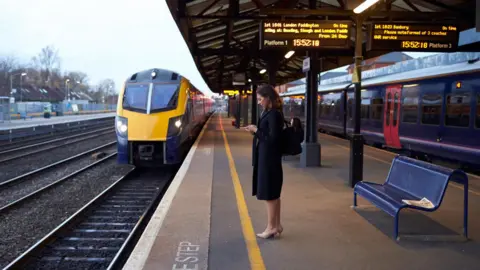The multi-billion-pound railway project intended to enhance the connectivity between Oxford and Cambridge has sparked significant outrage due to its designation as an “England and Wales” project. This classification has generated frustration and discontent particularly among Welsh officials and residents because, despite the project’s hefty investment of £6.6 billion, not a single track is projected to be laid within Wales. Critics argue that this misclassification has substantial consequences, primarily because it implies that Wales will be excluded from receiving any supplementary funding that could stem from the project.
David Chadwick, a Liberal Democrat Member of Parliament (MP) representing Brecon, Radnor, and Cwm Tawe, expressed his dismay on Radio Wales Breakfast, drawing parallels to the controversial High-Speed 2 (HS2) line project. The sentiment of betrayal resonates deeply within the Welsh community, as the classification means an additional financial disadvantage and reiterates a long-standing narrative of underfunding and neglect that many feel Wales has experienced historically in terms of infrastructure development.
Transport Secretary for the Welsh Government, Ken Skates, pointed out the established systemic issues that lead to Wales and its transport network being grouped within a broader infrastructure context that often to its detriment. He criticized previous governments for failing to revise these systems, resulting in an under-resourced infrastructure in Wales. Chadwick supported this view, declaring that Wales is potentially missing out on “hundreds of millions” in funding that could dramatically enhance its railway networks and public transport systems.
The UK Government has defended its financing mechanism, which it claims falls under the “rail network enhancements pipeline” that ostensibly benefits projects across both England and Wales. However, this argument did little to assuage the concerns of Welsh politicians and community leaders. Welsh officials cited the inadequacies of the funding system, which has historically favored England, leaving Wales without the added financial support it requires for significant upgrades and enhancements to its existing rail infrastructure.
With pernicious facts surrounding past rail investments, the discrepancies in funding allocation were further highlighted, shedding light on the prevailing dissatisfaction. Under the existing framework known as the Barnett Formula, England’s increased funding for railways does not result in corresponding financial boosts for Wales as it does for other devolved nations like Scotland and Northern Ireland. This has created a palpable sense of inequality whereby vocal Welsh politicians, including Plaid Cymru’s Westminster leader Liz Saville Roberts, labeled the project’s classification as “absurd.” They underscore that the project will yield no tangible benefits for Wales, emphasizing that such misclassification could cost Wales millions in essential resources for public transport development.
The Transport Salaried Staffs’ Association (TSSA) weighed in on the discussion as well. The union’s general secretary, Maryam Eslamdoust, expressed a call for transparency from Westminster officials. She expressed the view that labeling a project which contributes no new infrastructure to Wales as something that benefits “England and Wales” not only undermines faith in leadership but is likely to further complicate the already pressing infrastructure funding issues Welsh communities wrestle with.
Despite the contentious issues at hand, the UK Government pointed to efforts made in Wales to ameliorate underfunding through projects like the redevelopment of Cardiff Central Station and improvements to north Wales’ level crossings as evidence of ongoing investment. However, the argument yielded little comfort to critics who see these improvements as mere crumbs from the broader table, falling far short of the developed rail infrastructure that England enjoys.
In summary, the classification of the rail link project as an “England and Wales” initiative rather than strictly English has incited deep-rooted anger among Welsh political figures and advocates who suggest the arrangement is fundamentally inequitable. The sentiment reflects a broader historical pattern of perceived neglect and underinvestment in Wales, revealing an urgent need for recalibration in funding priorities to ensure the region is adequately supported in future infrastructure endeavors.



